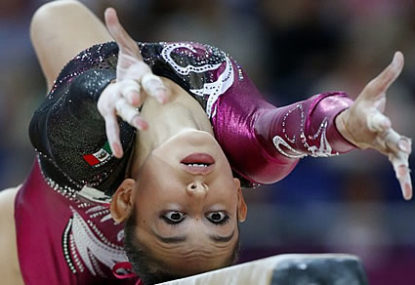'An iconic roster': LeBron, Steph, KD headline all-star cast for Team USA's shot at Olympic glory
LeBron James is going back to the Olympics for the first time in 12 years. Steph Curry is headed to the games for the…

Sports Illustrated heralded them as “America’s Game Changers.”
They were five female gymnasts, poised to be our generation’s new “Magnificant Seven,” the 1996 Olympic gymnastics team that won gold and the hearts of America in the process. In fact, when SI featured them on their cover, it was the first time since Kerri Strug in 1996 that a gymnast had graced the publication’s front page.
Then, they did it. We watched night after night as Gabby Douglas, Jordyn Wieber, Aly Raisman, McKayla Maroney, and Kyla Ross dominated the beam, the uneven bars, the vault, and the floor exercises.
They became sports icons seemingly overnight. Some, like Douglas, went on to find celebrity fame and returned for a second try at gold in the 2016 Olympics in Rio.
Yet, others quietly went back to living their normal lives. Sure, they’d bitten those gold medals on the podium and were, by all accounts, top in their class. But let’s not forget they were also teenagers, most of whom had spent their entire adolescence honing their craft.
One example? Maroney, who actually decided to quit elite gymnastics in 2016, telling SI she was “so bored with being unhealthy.”
Her decision to quit came after a 2012 knee injury, in which she tore her tibia at the Kellogg’s Tour of Gymnastics Champions. Even after turning pro in 2013 and undergoing knee surgery in 2014, she told SI she still wasn’t sure about returning to Rio and going for another shot at the gold.
Instead, she took an unexpected route and decided to pursue music instead, setting her sights on becoming a rap superstar in the vein of one of her icons, Drake.
It was a shocking if not totally surprising decision. After all, Maroney was arguably the most lively and entertaining one of the Five, contorting her face into humorously catty expressions before wowing everyone with her fine-tuned flexibility. The result? Judges were blown away, while tech-savvy spectators had a blast making memes out of her infamous smirk.
The meme-making reached new heights when Maroney fell on her backside after failing to stick a vault landing, landing her silver overall. Her look on the podium spawned the internet sensation known as “McKayla Maroney Is Not Impressed.”
Now, McKayla Maroney is not backing down.
In October 2017, she added her voice to the trending Twitter hashtag #metoo, a movement that actually began ten years ago, but picked up incredible speed this past fall as victims of sexual abuse joined together and rallied against the onslaught of sexual assault cases that came to light in recent months.
In a statement on Twitter (account since deleted), she revealed she’d been molested since the age of 13 by Larry Nassar, US Team doctor responsible for overseeing her care and the care of others on her team.
Her accounts were astonishing, and shed light on the fact that celebrity abuse of power isn’t just limited to the Hollywood lights, ala Harvey Weinstein.
Calling his acts “unnecessary and disgusting” she detailed how she endured them until she made her decision to leave the sport, helping us tie together her seemingly abrupt decision not to pursue gymnastics professionally and try for another medal.
After she came forward, two more of her former teammates decided to as well. Gabby Douglas and Aly Raisman both recalled abuse at the hands of Nassar, as did dozens of other women who claimed his treatments were anything but professional.
The reason the Douglas and Raisman didn’t come forward when Maroney did? They were “conditioned to stay silent,” as Douglas revealed in her statement.
These revelations leave us wondering how the news affects the legacy of the Fierce Five. There’s no denying their sportsmanship and fitness, and they’ll be remembered as family names due to the poised and professional way they dominated the world stage.
But now, they’re also remembered as a team plagued by controversy, whose collective abilities and achievements are unfortunately marred by the evil acts of one person.
That’s where we, as sports fans, come in. We can acknowledge these difficult claims and mourn with the victims. At the same time, we can continue to celebrate their victory and do our part to make sure this cloud of darkness doesn’t threaten to eclipse their moment in the sun.
There’s a reason we watch live sports, and why the Olympics are such a beloved competition across the world. We love to see the athletes we love at their prime. We love to see the neck-to-neck face-offs and the soaring finishes that leave us breathless.
We love to put ourselves in their shoes and think what it would be like to hear our country’s national anthem with a medal around our neck.
We watch them to escape real life. Then, when real life intersects and we’re forced to peek behind the curtain and see our superstars as real people with real problems, it hurts.
But it’s time to realise that what’s a “spectator sport” to us is a complex and difficult thing for many of our favourite sportsmen and women.
So let’s rally behind this team and give them as much support now as we did in 2012, and even more so. They appreciated our applause back then, but they need our attention now more than ever before.